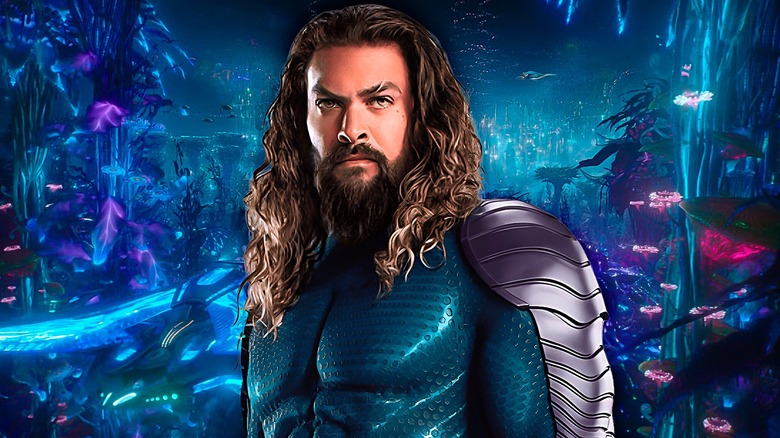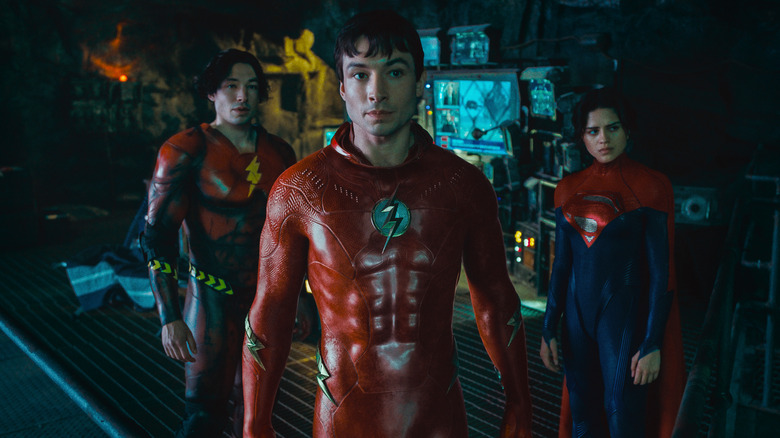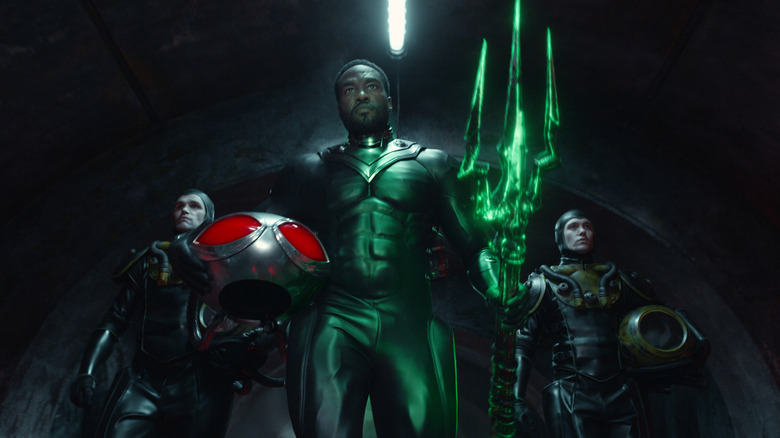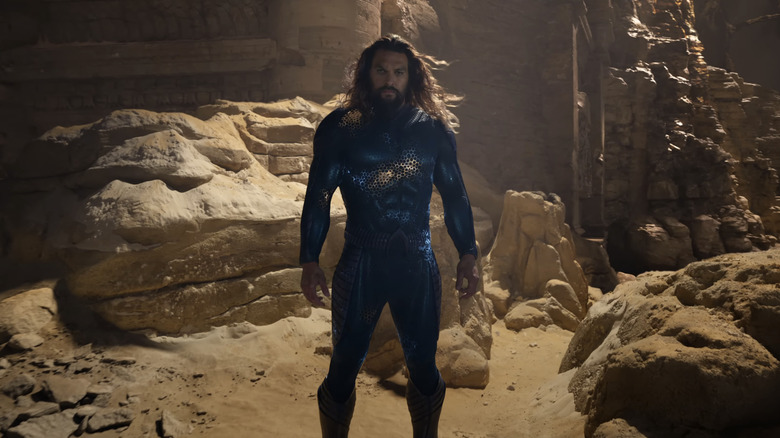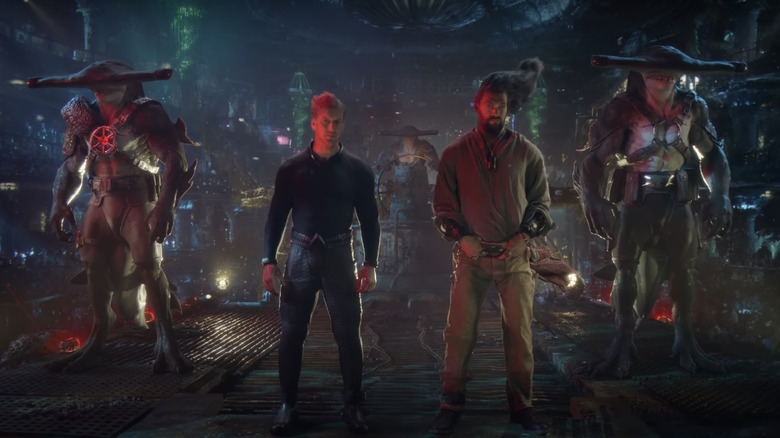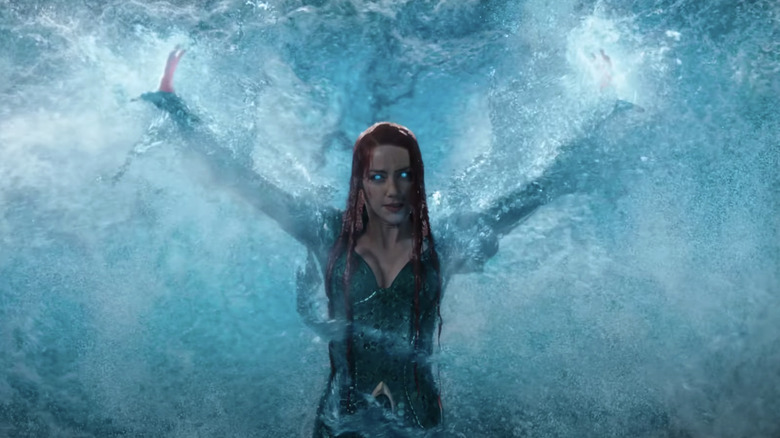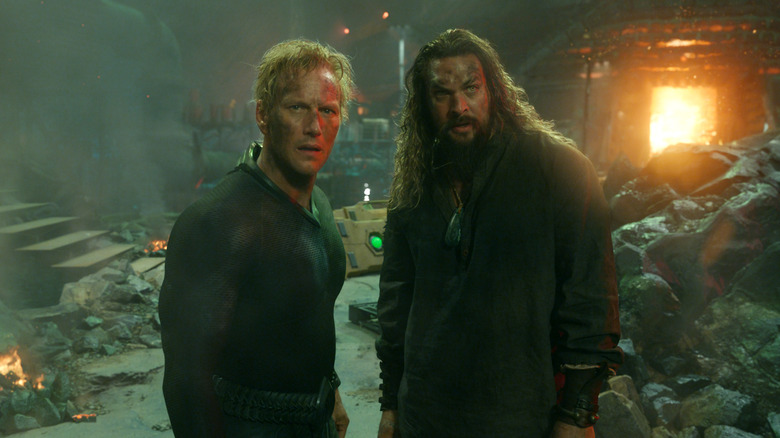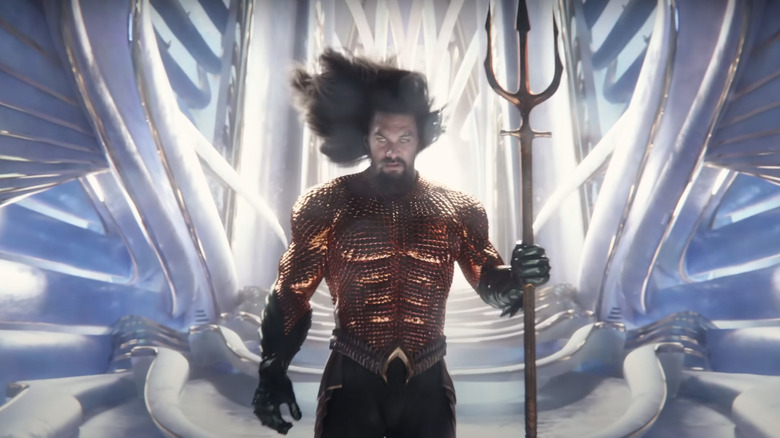Biggest Plot Holes In Aquaman And The Lost Kingdom
Contains spoilers for "Aquaman and the Lost Kingdom"
After the enormous success of 2018's "Aquaman," which grossed over $1 billion globally and still stands as the highest-grossing DC movie to date, a sequel was a no-brainer for the franchise-minded folks over at Warner Bros. Pictures. But no one could have possibly forecasted the waves of woes that lay in front of the sequel, which included unfavorable test screenings, multiple reshoots caused by constant changes in the DC Extended Universe's release slates, and boycott calls over one of its lead actors. The restructuring of Warner Bros. and DC Films led to the film's ultimate shipwreck moment: Being the final entry of an obsolete franchise that was announced to be rebooted a year before the film's release.
As a result, "Aquaman and the Lost Kingdom" shipwrecked into theaters five long years after "Aquaman" as DCEU's final offering, a franchise that had already been marred with enough flops and bombs to render the "Aquaman" sequel dead on arrival. Having faced a storm of such extremity would undoubtedly affect the film's quality and its storytelling coherence, especially when you factor in the multiple rounds of reshoots during which the screenplay saw plenty of changes through production. Those changes may have even been reflected in the final product, potentially causing many glaring fissures and holes in the story of "Aquaman 2" for audiences. So let's don our scuba suits and snorkeling gear as we dive into the biggest plot holes of what ended up being the DCEU's unceremonious swan song.
Where does the film fit into the DCEU after The Flash?
Released after the announcement of the DCEU's reboot, "The Flash," which followed the titular superhero (played by Ezra Miller) accidentally altering his universe's timeline and going on a multiversal adventure, was expected to narratively bridge the gap between the soon-to-be-defunct DCEU with new DC head James Gunn's upcoming DC Universe (or DCU, for short). However, the ending of "The Flash" left audiences with more questions than answers, especially with its post-credits scene featuring a cameo from Arthur Curry (Jason Momoa) that was more focused on playing for laughs how the film would lead into "Aquaman and the Lost Kingdom" instead of providing any substantive answer.
As a result, "Aquaman 2," as the endnote to DCEU, was put in the difficult position of having to answer any lingering questions about DCEU's transition into DCU. How did "Aquaman 2" handle this burden? By blatantly avoiding those questions, of course. The film nonchalantly ignores the timeline-altering events of "The Flash" and moves ahead with its story in apparent isolation from the larger DCEU, from which the film posits no connections or references to any events or characters. "Aquaman 2" gives the impression of existing in its own bubble and being somewhat intentionally ambiguous about where it places itself in the timeline of the cinematic universe, being solely aimed at continuing Arthur's story from the first film.
When asked about the film's connections to the DCEU, "Aquaman 2" director James Wan told Entertainment Weekly, "At the end of the day, the best thing I would say about this movie is that it is not connected in any way to any of those films," specifically referring to "The Flash."
Why didn't Black Manta kill Aquaman when he had the chance?
David Kane's (Yahya Abdul-Mateen II) defining characteristic is his desire for vengeance against Arthur Curry for causing his father's death in "Aquaman," which led him to don the mantle of Black Manta. The villain returns in "Aquaman and the Lost Kingdom" stronger than ever, determined to exact his revenge on Aquaman and the entire kingdom of Atlantis. However, one particular moment comes up early in the film when Black Manta gets the perfect opportunity to annihilate the Atlantean king, only to squander it.
During his escape from Atlantis after stealing its supply of Orichalcum, Black Manta lands in a one-on-one fight with Aquaman, which comes to a brief halt when Black Manta has Aquaman in his line of sight and is presented with a chance to shoot him down with his beams. Instead, the antagonist aims his beams at a nearby Atlantean train to distract Arthur and make his escape.
Given how much he makes his thirst for Aquaman's blood known throughout the entirety of his existence in the franchise, Black Manta's choice here to spare Arthur seems out of character. A case can be made that his actions were a result of being under the influence of Kordax (Pilou Asbæk), the fallen evil Atlantean king who needed the blood of his brother Atlan's descendant (which happens to be Aquaman) to break out of his curse. However, the film never indicates any conflict between Kordax and Black Manta regarding the choice to kill Aquaman, making this moment all the more confusing for audiences.
How does the new stealth suit work?
In "Aquaman and the Lost Kingdom," Arthur infiltrates the Fishermen tribe's prison in the Kingdom of Deserters and breaks his half-brother Orm (Patrick Wilson) out while wearing a new deep-blue suit that grants him the ability to camouflage with his surroundings. This allows him to keep his identity hidden from the Fishermen tribesmen at the prison, and by extension, avoid any complications between his kingdom and their tribe.
However, viewers would immediately notice that the suit grants Arthur absolute invisibility from head to toe, despite the absence of a helmet. The only explanation given for the suit's powers is that it comes from the camouflaging abilities of cephalopods such as octopuses and squids, but nothing about how it renders uncovered portions of the body (like Arthur's head) invisible too. Apart from this logical gap, the introduction of the suit brings on more questions, like why Arthur or any other Atlantean never used it as frequently as they could have throughout the film. Arthur certainly could have used it while infiltrating Black Manta's base at the volcanic island where he and Orm encountered several mutated enemies.
"Aquaman 2" director James Wan revealed in an Instagram post that the suit was inspired by the one introduced in the 1986 "Aquaman" comic book miniseries, where the Atlantean superhero uses the suit's blue color palette to camouflage with the blues of the ocean. It can be argued that this reasoning makes more sense as compared to Arthur using the dark suit that's visibly juxtaposed with the bright desert setting of the Fishermen tribe's biome.
How did Orm recover in a matter of seconds?
For his transgressions during the events of "Aquaman," Orm is imprisoned in the Kingdom of the Deserters underneath the Sahara desert, where he spends years malnourished and starved of water. By the time Arthur breaks Orm out in "Aquaman and the Lost Kingdom," Orm is in an extremely frail condition and too weak to put up a fight with the pursuing Deserters. After their chase ends with Orm running towards the ocean and seemingly passing out, a wave washes over him and grants him his former strength and form back, allowing him to defeat the Deserters with ease. After years of physical weakness, he doesn't seem to require time to heal and is immediately fit and ready to join Arthur's quest against Black Manta.
While it certainly makes sense that Atlanteans count on water for survival nearly the same way humans require breathable air, Orm's recovery plays out in such an instantaneous manner that it draws questions to how Atlanteans heal in general, and the role water plays in their recovery. Is water the only medication it takes for a gravely wounded, malnourished, and frail Atlantean to quickly recover? That theory doesn't make sense considering the number of Atlanteans that have been injured and slain in the underwater milieu of both the "Aquaman" movies. Obviously, Orm's swift recovery allows for the movie to continue with its plot, but it undoubtedly creates a glaring hole in the fictional biology of Atlanteans that has been established so far.
How does Arthur know nothing of Kingfish or the Sunken Citadel?
After Arthur breaks Orm out of prison, Orm takes Arthur to the Kingfish (Martin Short), the leader of the Sunken Citadel, which serves as a sanctuary for pirates and black marketeers of the underwater underworld. Kingfish has had dealings with both Black Manta and Orm in the past, leading Orm to believe the underwater crime lord might have some information as to Black Manta's whereabouts.
Orm poses as Arthur's captor, taking Arthur by surprise as he tells him that everyone in the Citadel, including Kingfish, abhors Arthur because of his title as the King of Atlantis. However, Arthur seems to have no knowledge about the Sunken Citadel or its status as a black market haven, which itself is an eyebrow-raising plot point. How is it that, despite having been the King of Atlantis for four years, Arthur has never heard anything about the large underworld lurking within the aquatic territories that he rules over?
Surely someone from the Atlantean council or the civilization's intelligence wing (if it has one) would have informed Arthur of the Citadel and its criminal elements, considering how their existence poses a threat to Atlantis and its civilians. Being a futuristic civilization of its kind, Atlantis would not only possess advanced weaponry and armies, but also adequate information and intel about the array of potential adversaries within the underwater realm, in addition to having a "Most Wanted" list of their own, which would invariably include Kingfish.
How did Mera heal without any visible scars?
After having served as somewhat of a secondary protagonist in "Aquaman," Mera (Amber Heard) is noticeably absent through most of the events of "Aquaman and the Lost Kingdom." Whether Mera's role in the film being cut was a direct result of the controversies surrounding Heard, remains conflictingly disputed by the film's director James Wan and the actress herself. However, the narrative reasoning behind Mera's absence is a serious injury she suffers from a direct hit of Black Manta's plasma beams when the villain tries to escape Atlantis with large supplies of Orichalcum.
Before Arthur leaves for his quest to rescue Orm, he visits Mera, who is hospitalized with major burn wounds all over her neck and chest. The visual severity of these wounds suggests it would take a long time for the character to heal from them, hence putting her out of commission for the rest of the film's storyline. However, Mera swoops back in to save Arthur and Orm later in the plot, having healed completely and showing no signs of her wounds or scars at all on the visible portion of her skin. Again, as we've pointed out with Orm's miraculous recovery earlier, the way that the film's characters heal so quickly without facing any permanent or long-lasting effects of their wounds creates a dissonance within the narrative reality of the film and the stakes it tries to create with its characters' fates. Putting a few band-aids on her wouldn't have hurt.
Why didn't Arthur give up the throne at the end?
Arthur Curry's character arc in 2018's "Aquaman" concluded with him dethroning his half-brother Orm from the kingship of Atlantis, and taking on his birthright in becoming the civilization's new and righteous king. However, when we see the character again in "Aquaman and the Lost Kingdom," Arthur no longer feels fulfilled by his kingly responsibilities, outrightly stating that he "hates" it.
The film's first act shows Arthur constantly falling short in his decisions and actions as the King of Atlantis, for which he also receives criticism from the Atlantean council. He's bored by the diplomatic and royal duties bestowed upon him, instead favoring being on the front lines and saving lives as Aquaman. After rescuing Orm, the two brothers squabble over the importance of the throne and all the responsibilities it brings, with Orm's seriousness on the matter indicating he'd be a more suitable king than the impulsive and impatient Arthur.
This interaction sets up a potential resolution for "Aquaman 2" where Arthur would hand the throne back to Orm after the latter redeems himself through the events of the film, with Arthur going back to do what he does best — saving the world as Aquaman. By the end of the film, Orm does regain the trust of Arthur and the other Atlantean royals he had wronged before, including Mera, Nereus (Dolph Lundgren), and the Brine King (voiced by John Rhys-Davies). In a resolution that conflicts with the seeds planted for the characters' arcs in the film's first half, however, Arthur retains his throne after a note of encouragement from Orm, and allows Orm to run away to avoid imprisonment in the kingdom.
Why is the entire world surprised by the revelation of Atlantis' existence?
At the end of the film, Arthur decides to publicly reveal the existence of Atlantis to the rest of the world in hopes of combating global warming and climate change through unity between his kingdom and the surface dwellers. The revelation of Atlantis and its Atlantean citizens becomes a big deal for the entire planet, with Arthur's announcement speech at the United Nations being broadcast all over the globe with eager onlookers.
Human beings are shown to be in awe of this seemingly historic moment. But should they really be surprised that there was an advanced underwater civilization hiding all this time? Keep in mind that humans in this universe have seen their fair share of non-human species such as Kryptonians, Amazonians, and several other metahuman individuals and races, while also knowing about the Justice League, which mostly consists of non-human superheroes. It stands to reason that the unveiling of another such civilization would mostly be met with indifference, if not outright skepticism, given the various potentially world-ending events that have been caused by villains like Zod and Steppenwolf.
Additionally, with the advanced level of knowledge and technology that the human race has acquired from the aftermath of such events, it's questionable how Atlantis remained hidden under the curious gaze of the surface world. The world already knew about Aquaman, which itself would have raised eyebrows about the possible existence of an underwater human species that inevitably would have led to its discovery — regardless of whether or not their unveiling would be welcomed by Atlantis.
